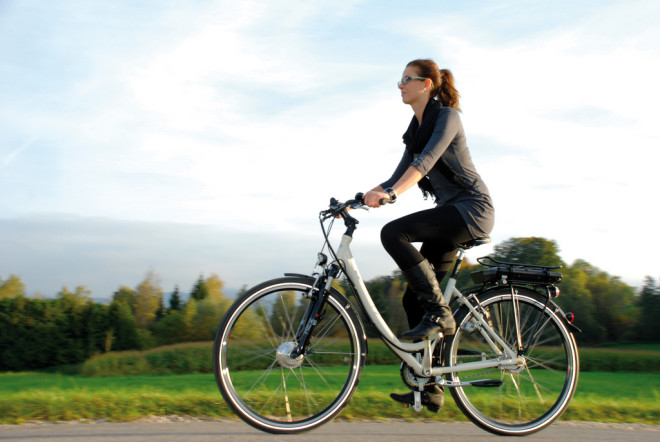
EU offers up to €8 million for innovation and research on powered two-wheelers
The EU Commission is going to fund research into powered two-wheelers for the first time. Consortia are now invited to bid for funds to research efficiency improvements to existing vehicles or even to propose exotic new vehicle types for research and prototyping.
Horizon 2020 is the EU’s new research program with an €80 billion budget aimed to make Europe a more competitive economy. Part of Horizon 2020 is the former “Green Cars Initiative”, which has now become the “Green Vehicles Initiative” (EGVI). Within the initiative, €5-8 million is identified for projects under the heading “Electric two-wheelers and new light vehicle concepts”.
“So who should be grabbing this category and making it part of their future? Which industry knows the most about successful development and deployment in this category? Which industry is hard at work talking to local governments about new infrastructure like inter-city cycling superhighways? Who has cargo bikes and bike share actually working for some of the major cities and delivery companies in Europe? The bike industry does, not the motorcycle and car industries. So it seems obvious to us that the bike industry will want to get actively involved in research consortia bidding for this cash,” ECF Development Director Kevin Mayne says.
Three promising programs to foster research on innovative vehicles
As part of Horizon 2020 the EGVI is the EU’s commitment to the vehicle technologies of the future. €5-8 million for “Electric two-wheelers and new light vehicle concepts” is the most eye-catching and obvious for the bicycle industry. But it is clear that some of the car oriented research will also have wide ranging implications for e-bikes and pedelecs.
EGVI used to be called the “Green Cars Initiative,” so as expected the funding continues to be focused on trying to get the electric car and freight sectors off the ground. But the bike industry cannot afford to ignore this work as it could benefit from the research investment going into key technologies. For example “Next generation of lithium ion batteries” expects a multidisciplinary approach to pursue cost, safety aspects, resistance to high-power charging, durability, recyclability and the impact of hybridization with industrial scale prototypes improving cell-level energy densities by at least 20%, and costs by 20%.
Similarly there is substantial investment in fuel cells and infrastructure under the Fuel Cells and Hydrogen Joint Undertaking which will be spending €23million on the development of these technologies and supporting infrastructure. With this level of investment ECF strongly recommends that manufacturers with a commitment to fundamental research and development in the E-bike sector start to engage with the wider programs of the EGVI.
Electric two-wheelers and new light vehicle concepts
While the call officially excludes the bicycle and pedelec category, it is aimed at the powered vehicle sector, so called “Type L”. This can include speed pedelecs and e-cargo bikes, and what’s more, the funding has an open invitation to develop innovative Light Electric Vehicle of the future.
The call for proposals has two elements.
The first element is a call to research focused on energy efficiency improvements for a wide range of vehicle types. Research will address cost efficiency, integration and modularity of battery packs, electric and plug-in hybrid power trains, system integration and innovative vehicle architecture.
The second element of the call is more fascinating. This part suggests funding could be available for the development and proof of concept of new ultra-light vehicles for passengers taking into account their integration with infrastructure and, where appropriate, considering any necessary changes to regulations to allow their use. “From the Information Day that we attended we learned that the EU is concerned that really innovative vehicle design in the small vehicle category seems to be dominated by non-European companies and researchers, such as concept vehicles from Toyota,” says Kevin Mayne.
“If (and this is the unknown) there is the space in the market for a truly innovative vehicle with mass market potential this is an unique opportunity for funding to get it through the concept phase and find out how it could legally fit into current infrastructure.” No other funding in this program allows for research of the legal aspects which ECF thinks is really important given ongoing safety concerns about speed pedelecs on cycle infrastructure.
Pedelecs: a new fashion on the corridors of the Commission
The Horizon 2020 call is only the most recent development in a series of EU endorsements of Pedelecs and powered two-wheelers. Just recently, the Commission’s DG Climate had recognized the potential for Pedelecs as a low-carbon transport choice – also for the first time. The study confirmed that electric bicycles are one of the most exciting low-carbon transport innovations and called for more investment into the technology.
“This is a message that ECF has been carrying for quite some time now,” says a smiling Kevin Mayne. “Just now, as the new EU budget has been approved, and funds are beginning to be distributed, the Commission hears it for the first time.”
What’s more, the Commission also funds ECF’s new Pro E-bike project. As a successor to the cargo bike-promoting Cyclelogistics project, Pro E-bike goes one step further and focuses on electrically assisted transport bikes.
Infrastructure and regulations part of the Horizon 2020 call
However, Kevin Mayne also says that effective cycling advocacy is still needed to push European, national and regional authorities to address the issue of lacking regulation. “The Horizon 2020 call takes this into account as well, saying that development of new vehicle concepts has to be taking into account their integration with infrastructure and, where appropriate, considering any necessary changes to homologation requirements and regulations to allow their use.”
The future looks bright for Pedelecs on the EU level it seems. “We simply need the Industry and advocacy organizations both do what they do best – the former, build great bikes and Pedelecs, and the latter, show their potential to policy makers and authorities,” says Kevin Mayne.
“And it’s only just beginning to work.”
About the authors

Kevin Mayne is ECF’s Development Director. He was Chief Executive of CTC, the UK’s national cyclists’ organisation for 14 years. He was also a member of the Board of Cycling England where he was a specialist on cycle training issues. In both roles he helped create millions of pounds of funding for cycling. He became a Vice President of ECF in 2007 and stood down to join the ECF staff.
Karsten Marhold works as Communications Assistant at the European Cyclists’ Federation. He has a masters degree in European history and cultures and is a researcher in European Integration in Brussels. His interests focus on cycling as a sustainable form of mobility and the corresponding EU policies.
- Log in to post comments
Contact the author
Recent news!
Upcoming events
Contact Us
Avenue des Arts, 7-8
Postal address: Rue de la Charité, 22
1210 Brussels, Belgium











